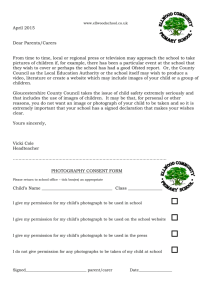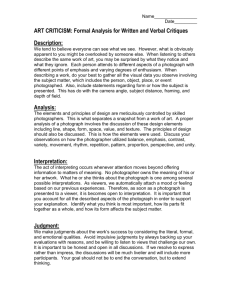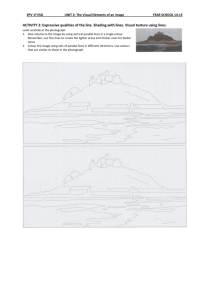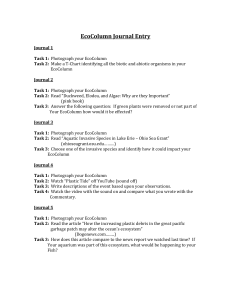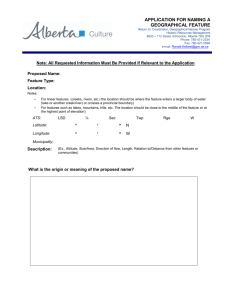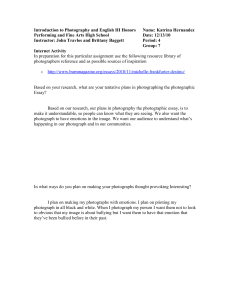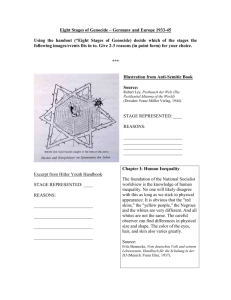A Photograph of Sham Chung
advertisement
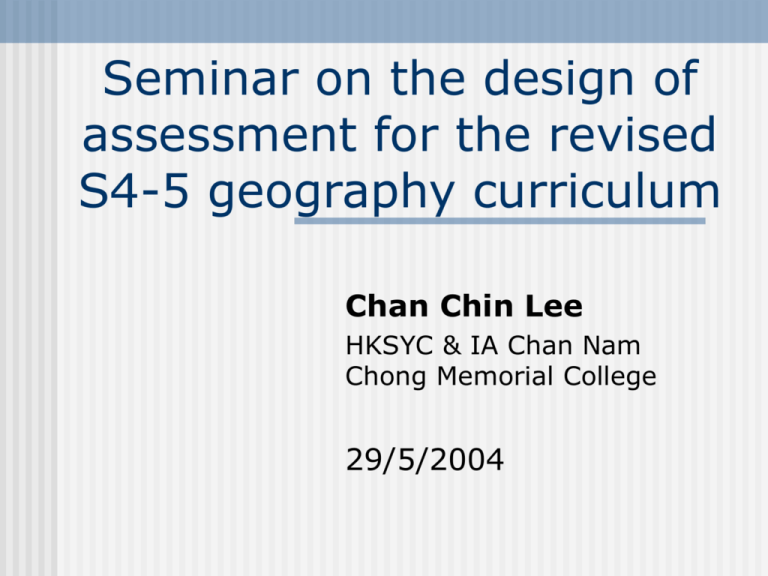
Seminar on the design of assessment for the revised S4-5 geography curriculum Chan Chin Lee HKSYC & IA Chan Nam Chong Memorial College 29/5/2004 Assessing geographical skills in written examinations How to assess geographical skills through examinations? (using the revised S4-5 geography curriculum as an example) How can written examination questions be designed to inform the progress of students’ learning? How to assess geographical skills through written examinations? Using the revised S4-5 geography curriculum as an example What geographical skills to be assessed? How to assess? What geographical skills? (HKEAA) Read and interpret a variety of maps at different scales Interpret ground and aerial photographs -to extract and analyze geographical information from them Observe, measure and record data (including interview) systematically and accurately Construct and test hypotheses in order to solve geographical problems Use appropriate geographical terminology to present materials and arguments Basic inquiry skills Ask and identify questions from a geographical perspective Locate and collect appropriate information and data from a variety of sources Select and use appropriate format such as text and illustrations to organize and present information and data Use appropriate methods to interpret information and data for making inferences and drawing conclusions Evaluate the answers, solutions or conclusions drawn from inquiry (HKEAA) Geographical skills Asking Geographic Questions Acquiring Geographic Information Organizing Geographic Information Analyzing Geographic Information Answering Geographic Questions Assessment of the following skills Map reading and interpretation Photograph interpretation Aerial photograph interpretation Assessment of map skills 1:20,000 map 1:5000 map Others Map reading – language Scale – linear, statement, R.F. Direction – compass points, whole-circle bearing, reduced bearing Grid reference and grid square - 6 figure, 4 figure Signs and symbols – contour lines etc. Map measurement and drawing Calculation of gradient Cross section drawing and calculation of vertical exaggeration Sketch map drawing/ copying Measurement of distance and area Map interpretation Interpret human, economic activities: e.g. settlement, communications, land use etc. Interpret physical landform: e.g. relief, drainage pattern etc. Problem solving and decision making Refer to the map extract of Sham Chung (HM20C sheet 8 Sai Kung) Describe the relief of Sham Chung (grid square 2084) and the surrounding. Skills assessed: 1. 2. 3. 4. 5. Symbols: contour lines, drainage, coast line etc. grid references: location of the hills etc. accurate height measurements: the height of Sham Chung village, trigonometrical station etc. compass directions: north of Sham Chung….etc. landscape features: river valley etc. Describing and explaining location There is a plan to develop Sham Chung into a resort comprising villa guesthouses and a golf course. Describe and explain the favourable and unfavourable locational factors. Skills assessed: Describing location: 1. Compass directions: higher ground to the east, bay to the west etc. 2. Distances: of the footpath from Yung Shue O etc. 3. Symbols: ferry pier, footpath, secondary roads, country park’s boundary etc. 4. Grid references: location of ferry pier etc. 5. Landscape features: river valley etc. Skills assessed (cont’) 1. 2. Explanation of the locational factors: Map interpretation: -influence of the settlement, communication, landform features, country parks etc. Decision making: -favourable or unfavourable factors. There is a plan to develop Sham Chung into a resort comprising villa guesthouses and a golf course. As the Secretary for the Environment, Transport and Works, will you agree such development. Explain your stand point. Skills: map interpretation, present arguments How can written examination questions be designed to inform the progress of student’s learning? Skills summary sheet Skills assessed Identification of symbols Identification of features Use of grid reference Use of compass direction Description skill scores Structured questions Identify; name; match: Skills: map reading Draw: (sketch map, cross-section etc.) Skills: drawing Measure; calculate: Skills: measurement, scale, calculation Describe; compare; contrast Skills: map reading, direction, grid reference Explain Skills: interpretation of relationships, organization, making inferences, drawing conclusions Suggest solutions Skills: problem solving, decision making Evaluate Skills: present arguments, decision making, drawing conclusions Structured questions to inform the progress of students’ learning Identify the landform feature at grid reference 208845. Skills: landform identification Find the highest point in the grid square 2084. Give its 6 figure grid reference. Skills: grid reference, contour lines trigonometrical station Describe the landform north of Sham Chung (208845). Skills: compass points, contours, landform identification Explain how the landform is favourable for the development of Sham Chung into a resort. Skills: map interpretation Map measurement and drawing skills Refer to the map extract of Sham Chung again (HM20C sheet 8 Sai Kung) Assessment of map drawing Draw a cross-section from the trigonometrical station 180 (grid reference 204848) to 210836) with a vertical scale of 1 cm to 50 m. Skills: drawing, scale Calculate the vertical exaggeration of the cross-section. Skills: calculation Refer to the cross-section and the map extract, explain why Sham Chung is suitable to develop into a resort with golf course and villa guesthouse. Skills: map interpretation, decision making, symbols, grid reference, landscape features Assessment of map measurement Measure the distance of the footpath from Sham Chung (209842) to Yung Shue O (214826). -Skills: measuring distance, grid reference, symbols. Calculate the time required for the villagers to walk from Sham Chung to Yung Shue O. (The speed of walking = 4 km/ hr) -Skills: Simple calculation Explain how does it hinder the development of Sham Chung. Skills: map interpretation, decision making Suggest solutions to solve this problem. Skills: symbols, grid reference, map interpretation, decision making Photograph interpretation skills Photograph reading – identify features, pattern Photograph interpretation – interpreting patterns and relationships Sketching, scale, direction Integration of map and photograph interpretation A Photograph of Sham Chung Please refer to Photo 9 on the website below: http://www.cexplorer.com/tshamchung2.htm Refer to the photograph of Sham Chung and the map extract. Draw a sketch of the photograph to show the land uses. Skills: photograph interpretation, sketch drawing Account for the land uses as shown in the sketch. Skills: map interpretation, photograph interpretation, Refer to the photograph of Sham Chung and the map extract. Identify the land use A in the photograph Skills: photograph reading Account for the occurrence of land use A in Sham Chung Skills: photograph interpretation, map interpretation Another example of map and photograph interpretation A Photograph of Sham Chung Please refer to Photo 10 on the website below: http://www.cexplorer.com/tshamchung2.htm Refer to the photograph of Sham Chung and the map extract. From which direction was the photograph taken? Skills: map reading, direction With the support of photographic evidence, argue against the development of Sham Chung into a resort with golf course and villa guesthouse. Skills: photograph interpretation, present arguments Aerial photo interpretation skills Recognition of features Sketch drawing Scale, direction Interpretation: patterns, relationships Aerial photograph interpretation A Refer to the aerial photo of Kowloon 5.11.84 56988 (Survey and Mapping Office Building and Lands Department Hong Kong Government) Assessment of aerial photo interpretation skills Compare and contrast the characteristics of land use in A and B. Skills: recognition of features, patterns Describe the urban problems in A Skills: interpretation, inference Explain why urban renewal is needed in A. Skills: interpretation, presenting arguments
